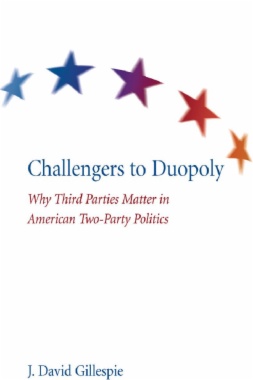Building on the foundational importance of its predecessor (Politics at the Periphery, 1993), Challengers to Duopoly offers an up-to-date overview of the important history of America's third parties and the challenge they represent to the hegemony of the major parties. J. David Gillespie introduces readers to minor partisan actors of three types: short-lived national parties, continuing doctrinal and issue parties, and the state and local significant others. Woven into these accounts are profiles of some of the individuals who have taken the initiative to found and lead these parties. Ross Perot, Ralph Nader, Jesse Ventura, and other recent and contemporary electoral insurgents are featured, along with the most significant current national and state parties challenging the primacy of the two major parties.
Gillespie maintains that despite the infirmities they often bear, third parties do matter, and they have mattered throughout American public life. Many of our nation's most important policies and institutional innovations—including abolition, women's suffrage, government transparency, child labor laws, and national healthcare—were third-party ideas before either major party embraced them. Additionally, third parties were the first to break every single de facto gender, race, and sexual orientation bar on nomination for the highest offices in the land.
As Gillespie illustrates in this engaging narrative, with the deck so stacked against them, it's impressive that third-party candidates ever win at all. That they sometimes do is a testament to the power of democratic ideals and the growing distain of the voting public with politics as usual.
- Cover������������
- Title Page�����������������
- Copyright Page���������������������
- Table of Contents������������������������
- List of Illustrations����������������������������
- Preface��������������
- 1: Duopoly and its Challengers�������������������������������������
- 2: Protecting Major-Party Turf�������������������������������������
- 3: On the Outside, Looking In������������������������������������
- 4: Constitutionalists, Greens, and Libertarians������������������������������������������������������
- 5: The Early Years: Short-Lived Parties before 1860����������������������������������������������������������
- 6: Union, Reform, and Class: Short-Lived Parties, 1860–1908
- 7: Thunder Left and Right: Short-Lived Parties, 1912–1960s
- 8: George Wallace and Beyond: Short-Lived Parties, 1968 and After������������������������������������������������������������������������
- 9: The New Independents: The Anderson and Perot Movements
- 10: Taking the Less-Traveled Road: Women, African Americans, Latinos���������������������������������������������������������������������������
- 11: Doctrinal Parties 1: The Socialists and Communists�������������������������������������������������������������
- 12: Doctrinal Parties 2: The Neo-Nazis���������������������������������������������
- 13: State/Local Significant Others�����������������������������������������
- 14: Looking Back, Looking Ahead: The Third-Party Legacy and the Future�����������������������������������������������������������������������������
- Appendix 1: Web Sites of Nonmajor Parties and Related Information Sources��������������������������������������������������������������������������������
- Appendix 2: Minor-Party and Independent Candidates Receiving More Than 1 Percent of Popular Vote for President
- Appendix 3: Candidates and Votes for President, 2008�����������������������������������������������������������
- Appendix 4: Third-Party and Independent Gubernatorial Popular Elections
- Appendix 5: Third-Party Presence (Excluding Independents) at Opening Sessions of the U.S. Congress
- Appendix 6: Post-World War II Third-Party and Independent Members of Congress
- Notes������������
- Suggestions for Further Reading��������������������������������������
- Index of Parties, Associations, and People�������������������������������������������������

